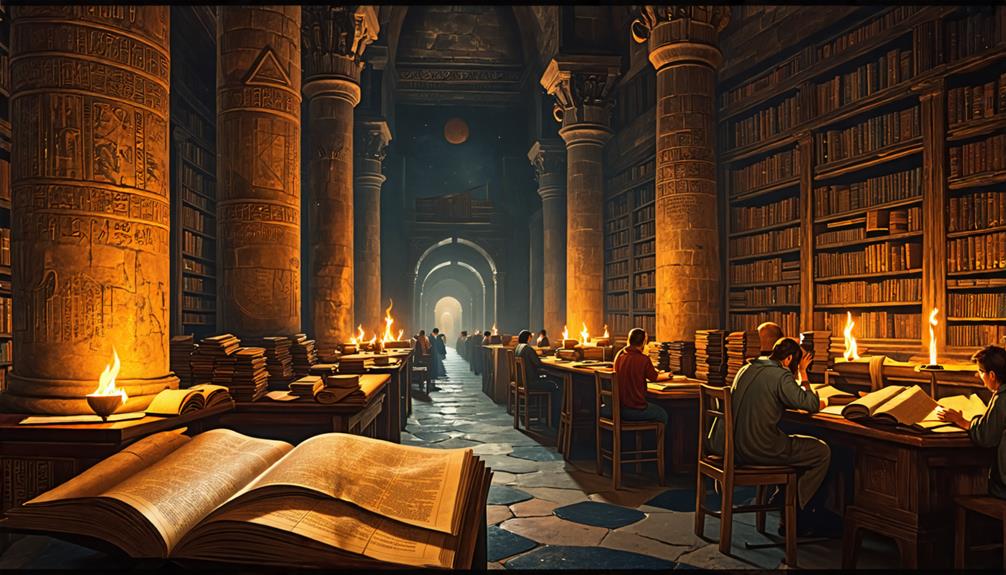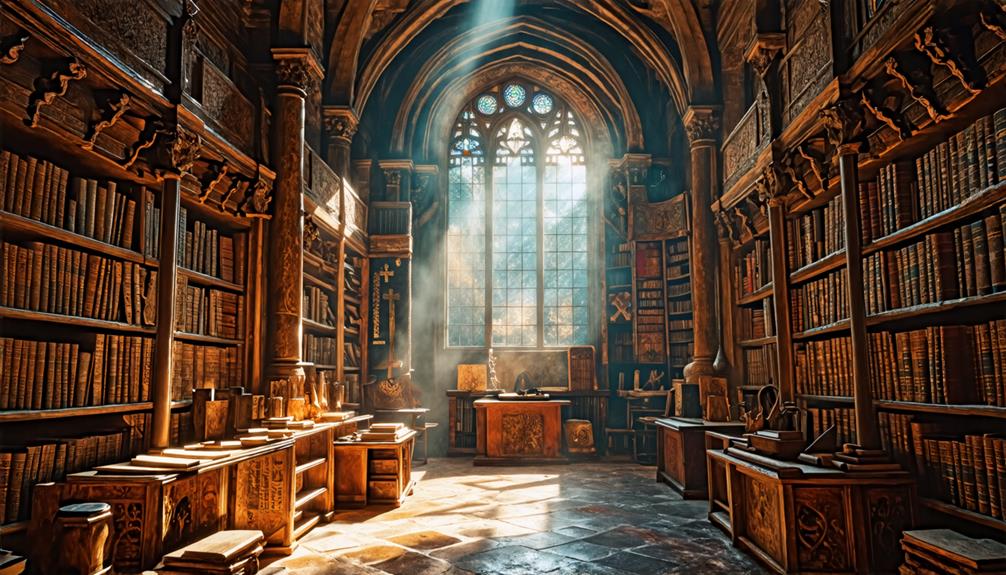The Library of Alexandria was the greatest repository of knowledge in the ancient world. But what if this legendary institution had never been destroyed?
Let's imagine an alternate timeline where the Library of Alexandria survived intact. How might world history have unfolded differently if its vast wealth of knowledge had been preserved for future generations?
The Library housed works from the greatest minds of antiquity, including many that are now lost to us. If these had endured, they could have accelerated progress in mathematics, engineering, astronomy, medicine, and many other fields. Our world today might be centuries ahead in scientific understanding and technological capabilities.
Furthermore, the Library's survival could have profoundly impacted the development of art, literature, philosophy, and religion. Innumerable works of genius in these domains might have found their way to us, transforming our culture, beliefs and way of life in ways we can only speculate about.
The unbroken transmission of ancient wisdom could have set civilization on a radically different course.
Preserving Ancient Knowledge

Had the Library of Alexandria survived the turmoil it faced, it's possible that the world would have access to an unparalleled collection of ancient texts. These texts could have provided invaluable insights into the minds and lives of our ancestors, covering subjects like philosophy, mathematics, history, and literature.
One theory is that this knowledge could have accelerated scientific and technological advancements, potentially leading to earlier breakthroughs in various fields.
Another possibility is that the preservation of these ancient texts might've influenced the course of history, shaping political and social structures in different ways. It's also conceivable that the library's survival could have led to a greater understanding and appreciation of diverse cultures and ideas.
While the Library of Alexandria wasn't rebuilt, there have been efforts throughout history to create similar repositories of knowledge, such as the House of Wisdom in Baghdad during the Islamic Golden Age.
Accelerating Scientific Advancement
Had the Library of Alexandria survived, it's possible that the wealth of knowledge it contained could have accelerated scientific progress by centuries. One theory is that this head start would have led to earlier advancements in fields like mathematics, astronomy, medicine, and engineering.
It's hard to say exactly how the world would be different, but some speculate we might've seen key discoveries of the Renaissance or later eras happening much sooner. Of course, it's also possible that even with this knowledge, societal factors could have still slowed progress.
While the original Library was lost, some of its works did survive in other collections. The idea of a 'universal library' has been attempted at later points in history by others, like the House of Wisdom in Baghdad during the Islamic Golden Age.
Influencing World Religions

The survival of the Library of Alexandria could have led to significant changes in the development and spread of world religions. One possibility is that the preservation of a wider range of ancient religious texts might've provided scholars with a more comprehensive understanding of how these belief systems evolved over time.
Additionally, the Library's role as a center of learning could have facilitated greater exchange of religious ideas between cultures, potentially giving rise to new syncretic faiths that blended elements from different traditions.
It's important to note that while the Library of Alexandria was unique in its time, similar scenarios of cultural exchange and preservation occurred later in history. The House of Wisdom in Baghdad, which flourished during the Islamic Golden Age, served as a hub for the translation and study of texts from various cultures and religions. This demonstrates that the cross-pollination of ideas and the preservation of knowledge have been ongoing processes throughout history, shaping the religious landscape in complex ways.
Ultimately, the impact of the Library of Alexandria's survival on world religions remains a matter of speculation. While it could have led to increased religious tolerance through exposure to diverse beliefs, it's equally possible that it might've fueled religious conflicts or given rise to entirely new religious movements.
The complex interplay of cultural, political, and social factors makes it challenging to predict the exact outcomes of this hypothetical scenario.
Shaping Political Landscapes
Had the Library of Alexandria been preserved, it may have significantly influenced political landscapes throughout history.
One theory is that philosophical ideas would have shaped governance earlier and more profoundly, as rulers would have had access to a broader range of political treatises from various cultures. This exposure could have potentially accelerated the evolution of political thought and led to more enlightened decision-making by leaders.
It's possible that comparative studies of governments and laws across different societies, facilitated by the library's vast collection, would have altered the course of nations and empires.
While the Library of Alexandria wasn't preserved, similar attempts to collect and preserve knowledge were made later in history, such as the House of Wisdom in Baghdad during the Islamic Golden Age.
However, the scale and breadth of the Library of Alexandria remain unparalleled.
Impacting Modern Academia

Had the ancient wisdom housed in the Library of Alexandria survived, it's likely that modern academia would look quite different. One theory is that scientific breakthroughs might've been accelerated due to the preservation of ancient knowledge, potentially leading to earlier advancements in fields like medicine, astronomy, and engineering.
The survival of the library could have also meant a more comprehensive understanding of history, literature, and philosophy. This expanded knowledge base might've enriched scholarly discourse and led to new insights and interpretations of ancient texts and ideas.
It's possible that the library's survival would have encouraged more interdisciplinary research, as scholars from various fields could have had access to a wider range of information. This could have led to innovative connections between seemingly disparate subjects, fostering a more holistic approach to academia.
Interestingly, there have been attempts to recreate the Library of Alexandria in modern times. The Bibliotheca Alexandrina, inaugurated in 2002 in Alexandria, Egypt, aims to recapture the spirit of the ancient library and serve as a center for learning, dialogue, and understanding.
Conclusion
You've grasped the gravity of this intellectual tragedy, a wound that time can't heal.
The Library of Alexandria's destruction was a devastating blow, forever altering our world's trajectory. Its survival could have bridged ancient wisdom and modern innovation, creating a renaissance for the ages.
The library's ashes serve as a haunting reminder of lost knowledge and unrealized potential, forever leaving us to ponder the profound advancements and enlightened societies that might've been.

Leave a Reply